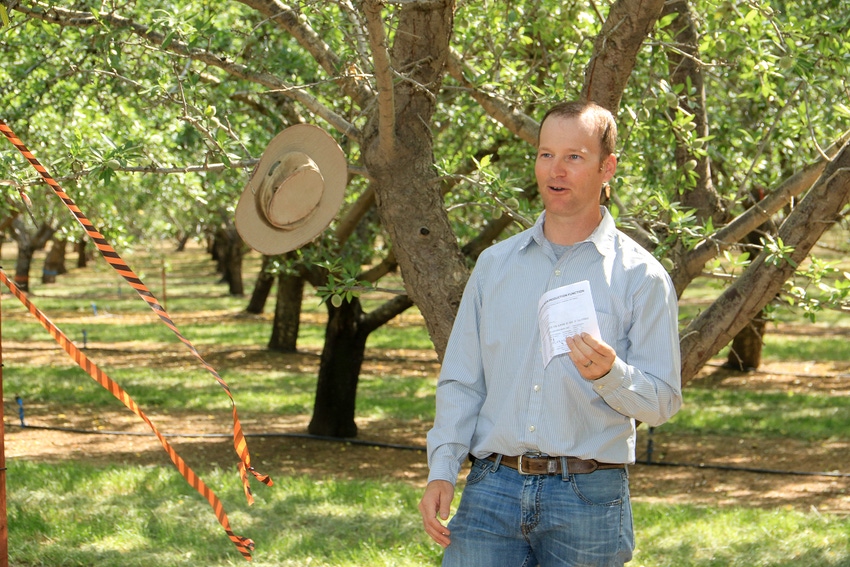
The stagnation of public funds available for University of California Cooperative Extension programs and research led an California farm advisor to a 21st century thought.
David Doll is the pomology farm advisor in Merced County who more people may simply know as “The Almond Doctor” for the website he created with the same name.
Several years ago, Doll came up with a plan to crowd source some funding to help the county Extension office pay for projects that otherwise fell to the wayside as slim sources of revenue found other priorities.
“Over the years there has been a consistent erosion of base funding for our services, not only from UC, but from county and federal governments,” Doll said.
In the past, Doll solicited funds from farmers and commodity groups – funds not always guaranteed from year-to-year, though he admits consistent commitments from groups representing tree nuts. Still, it’s not enough to cover everything and these funds can come with specific spending parameters – in other words “strings attached.”
Through his contacts with almond growers in his count,y Doll secured about $14,000 from less than 10 donors now part of an endowment which the Merced County Extension can budget annually in perpetuity.
Endowments are basically an interest-bearing account with a principal amount which generates interest annually. The initial endowment principal remains unchanged, or can grow as new donations are made. Accrued interest from the endowment is paid out annually.
According to Andrea Ambrose, director of corporate and foundation relations with the University of California Agriculture and Natural Resources Division (UC ANR), the Merced County Extension staff can plan on at least $500 per year based on the initial endowment.
As the endowment’s principal grows, the interest will as well. Interest payments are currently capped at 4.2 percent of the principal, according to Ambrose. Interest earned beyond the amount is folded back into the principal each year.
While endowments are not a new idea, UC ANR has several of them to benefit commodities including pistachios, rice, and other targeted programs. No other county Extension office has one.
Doll began pitching the idea last March to almond growers he works with. By June, he had more than the minimum $10,000 necessary to start an endowment. Solicitations were made in person and through The Almond Doctor website.
“I’m hoping for about $250,000, but people tell me that’s wishful thinking,” Doll told Western Farm Press.
Since the endowment was written specifically for Merced County, the money remains under complete control of the county Extension office which Doll says will be managed by committee.
Merced County Cooperative Extension Director Scott Stoddard said this was an idea Doll approached him about three years ago. The original idea was to fund office support that would effectively free up the researchers to spend time in the field – something Doll and Stoddard prefer.
As Extension budgets effectively remained flat and demands grew, ideas sometimes died on the vine for lack of time and hands.
Doll says it takes time to plan and manage even the shortest of field day events. A half-day field event can easily take several days to plan and secure speakers, plus gaining permission from a grower to have the event, creating flyers, notifying people, etc.
“I can sit in my office and complain that I don’t have time for this and just not do it, or I can find another mechanism to get it done,” he says.
Doll points to relationships he’s built over the years with various groups to help him plan and organize these field days. He cited the San Joaquin Sustainable Farming Project as a partnership he has enjoyed for about a decade. They help him by organizing field days. They also partner in similar ways with other Cooperative Extension offices.
“David’s a problem-solver,” says Merced County almond grower Galen Miyamoto, a donor who helped bring the endowment to fruition.
Miyamoto says Doll’s desire to bring applied research and practical advice to growers is evident in his willingness to work with farmers. Miyamoto has benefitted from Doll’s advice on agronomic issues, particularly on water management as “this was so critical for us over the past several years.”
“He has a passion for what he does, and it shows,” Miyamoto said about Doll.
For Doll, the premise behind the endowment is to maintain Extension programs for what they are – the ability and need to transmit complicated, scientific research and information to growers in practical ways to immediately employ in fields and orchards.
Miyamoto praised Doll for his ability to convey useful information in ways farmers can understand and use.
“He’s an excellent teacher,” the grower said.
In the early years as the endowment annually generates less than $1,000, Doll says funds could improve The Almond Doctor website or even buying portable signs for roadside use to point farmers to field day locations.
“I’d love for this endowment to support research,” he says. Still, he says there are basic needs that must first be addressed to help get the word out about research and programs.
Tax deductible donations can be made onlline at http://tinyurl.com/y9w6nhvp.
About the Author(s)
You May Also Like






